On November 30, 2022, OpenAI offered a conversational AI provider referred to as ChatGPT.
ChatGPT blew up in popularly just about in one day. Inside of 5 days, it had already reached a million customers. By the use of comparison, it took Fb more or less 10 months to hit 1,000,000 shoppers.
All of which is to say: There is also clearly name for for the ones conversational AI products and services and merchandise. And each and every Google and Microsoft have taken apply.
While each and every corporations have invested in AI for years, it sort of feels that ChatGPT has sparked an urge for Google and Microsoft to speed up the discharge of their own conversational equipment. On February 6, Google introduced it is personal conversational AI carrier, known as “Bard”. And, merely one day later, Microsoft offered its personal new model of Bing, powered through AI.
And, from a consumer perspective, I get it. The ones equipment are a laugh. Consider the stunning answer I get to the query, “Can you tell me a shaggy canine tale a few cat?”
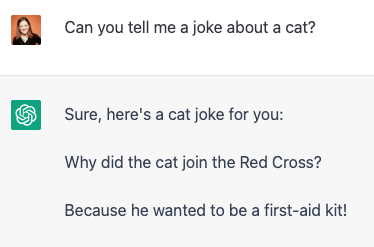
At its core, the ones equipment would possibly simply upend how marketers search for similar knowledge and distill that knowledge into content material subject matter for their audiences. Proper right here, let’s uncover the differences between Bard, AI-powered Bing, and ChatGPT, plus the pros and cons of each and every.
First — What’s ChatGPT?
The “OG” inside the home, ChatGPT offered in November 2022. It’s owned thru OpenAI, and is a unfastened, publicly accessible tool (although, as of February 1, there’s now a paid subscription style referred to as ChatGPT Plus).
ChatGPT uses a natural language processing tool to tug knowledge from across the web to reply to search queries, or even whole content material subject matter requests like “Can you write an email correspondence to my boss to tell her I’m misplaced of labor on Friday?”
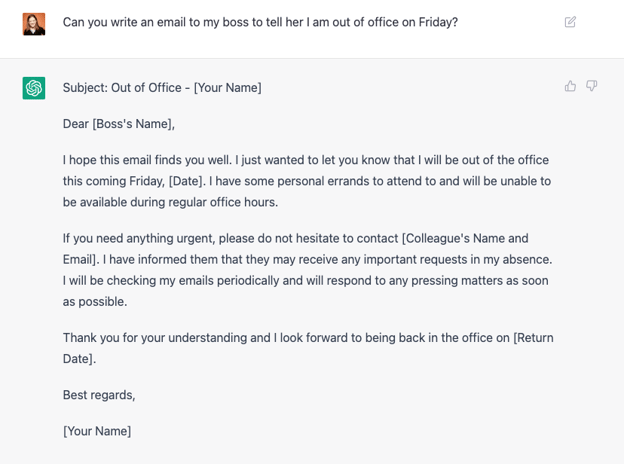
By contrast to a search engine, the answers it provides you could be original, that suggests it’s no longer just a copy-and-paste from elsewhere on the internet, on the other hand instead distills that knowledge into its private conversational language.
However, one of the vital necessary greatest drawbacks of ChatGPT is that the tool isn’t in a position to discerning proper from unsuitable knowledge it pulls from the web, because of this your answers might be unsuitable. OpenAI admits as a lot, pointing out “ChatGPT from time to time writes plausible-sounding on the other hand unsuitable or nonsensical answers.”
Additionally, ChatGPT is limited to 2021 data, so the ideas it pulls from isn’t always necessarily probably the most up-to-date.
Irrespective of its limitations, ChatGPT is an impressive tool for helping marketers draw inspiration, or create a powerful first draft for a piece of content material subject matter.
As an example, a marketer would most likely search “execs and cons of AI” and use ChatGPT’s answers to inspire a long term blog publish on the subject; however, a marketer would possibly simply search “write a blog publish on the execs and cons of AI”, and use the response as a number one draft to a blog publish.
It’s important to apply: I emphasize ‘first draft’ because of marketers should however be informed via and edit the content material subject matter for tone of voice, along with ensuring the ideas is right kind and helpful to your audience.
Pros:
- Can lend a hand marketers draft emails, blog posts, essays, product descriptions, or even code.
- May give inspirational content material subject matter for marketers who don’t appear to be certain one of the best ways to start out a blog publish on a subject, or don’t appear to be certain the angle they want to take on a given subject.
- Can pull assets across the web to provide marketers with a powerful starting point when enticing in research (then again, that content material subject matter should be vetted to ensure accuracy).
Cons:
- Can pull from faulty assets and provide unsuitable knowledge.
- Guesses the shoppers’ intent, on the other hand isn’t in a position to asking clarifying questions to get the correct answer to the individual, so it’s up to the individual to ensure their query provides the correct consequence.
- All data provided from ChatGPT is from 2021, so it will nicely be old-fashioned depending on the subject.
- Does now not necessarily give complex or nuanced answers to queries.
Adequate … What about Google’s “Bard”?
Google’s private experimental conversational AI provider, which is powered thru LaMDA, is referred to as “Bard”, and is just lately accessible to choose, depended on partners in a beta phase — on the other hand Google has promised it’s going to grow to be to be had to most people in coming weeks.
Bard would possibly simply shift the way in which by which marketers use serps. It is extremely very similar to a search engine in that it pulls knowledge from across the web to provide new, high-quality responses — on the other hand it’s meant to provide additional nuanced responses to shoppers’ search queries.
In essence, it might make a marketer’s procedure more uncomplicated thru providing different perspectives in one place for a marketer to sift via, versus spending hours clicking via different articles on a given subject.
One of the vital compelling choices of Bard is that it’s trained to hunt out patterns in sentences to create dialogue with the individual, versus simply cutting-and-pasting knowledge from the internet.
Throughout the Bard announcement, Google moreover mentions rolling out new AI-powered search choices temporarily. AI-powered search results would possibly simply imply you’ll get answers to questions that would not have a clear correct and improper answer.
Throughout the example Google provided, an individual would possibly simply search “Is the piano or guitar more uncomplicated to learn, and how much stick with does each and every need?”
At the present time, for many who search that query, you get a response like this one:
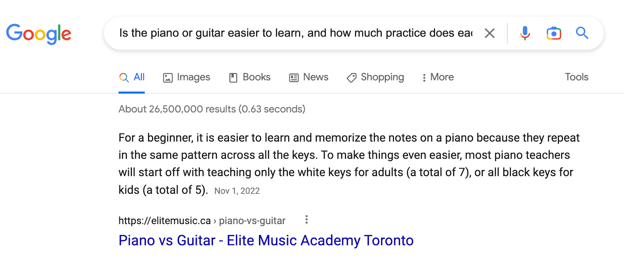
However, the featured response (like the one confirmed above) isn’t always a completely whole answer to a fancy question.
As an alternative, when leveraging the help of AI, you might want to get an answer along the lines of, “Some say the piano is more uncomplicated, since the finger and hand movements are additional natural … Others say that it’s more uncomplicated to learn chords on the guitar and you might want to to choose up a strumming building in a couple of hours.”
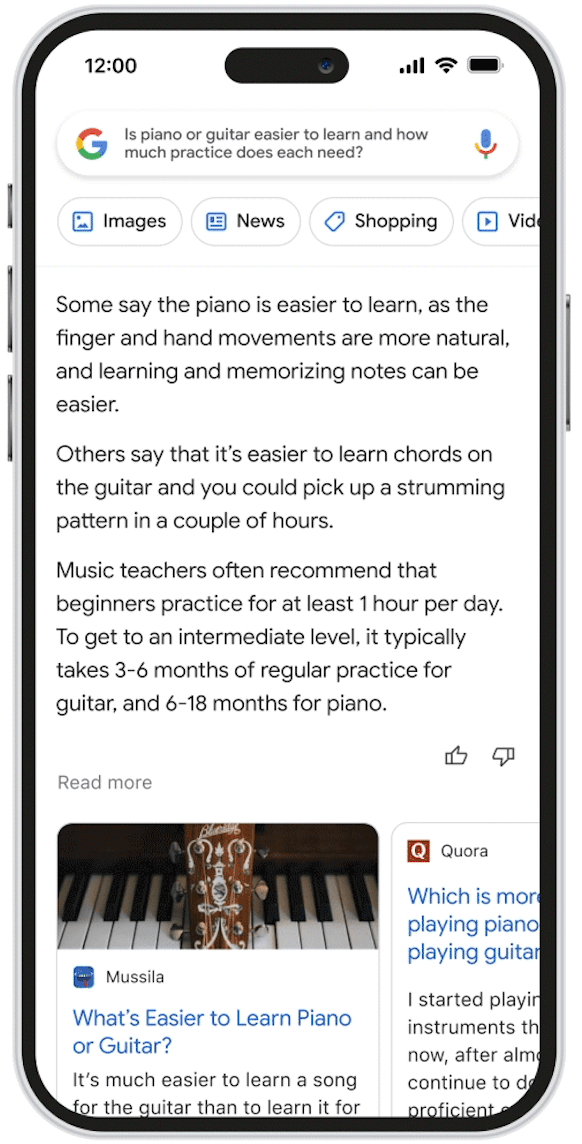
Pros:
- Lets in marketers to have interaction in a conversation with Bard to ask clarifying or follow-up questions, which is in a position to allow marketers to get deeper insights on a given subject.
- Helps marketers in short understand both sides of a subject thru finding out nuanced responses, versus just one simple response.
- Marketers can truly really feel reassured that the ideas Bard pulls from the web is additional up-to-date than ChatGPT.
Cons:
- Like other AI-powered conversational products and services and merchandise, Bard is imperfect and can serve up faulty, false, or biased knowledge. If truth be told, Google has already out of place $100 billion in shares after the chatbot made an error all the way through the demo.
Is Microsoft’s AI-powered Bing the Clear Winner?
In spite of everything, let’s talk about Microsoft’s new, AI-powered search choices which will also be already available on Bing, primary me (and quite a lot of others) to swiftly make an account to get on the in a position record.
By contrast to ChatGPT and Bard, Microsoft’s Bing chatbot isn’t a conversational AI provider: As an alternative, this can be a search engine boosted thru AI, which permits Bing to provide shoppers with additional complex, chat-like responses to queries.
Additionally, shoppers are in a position to respond to the hunt queries with follow-up questions and have a whole conversation with the chatbot on a given subject. Microsoft’s labelled it a “AI copilot for the internet”.
Even though Microsoft has invested billions of bucks in OpenAI, the company tells shoppers that their style is much more tricky than ChatGPT.
As they have mentioned of their announcement of Bing’s AI search choices, “We’re excited to announce the new Bing is operating on a brand spanking new, next-generation OpenAI huge language sort that is additional tricky than ChatGPT and customized particularly for search. It takes key learnings and trends from ChatGPT and GPT-3.5 – and it’s even sooner, additional right kind and further capable.”
Consider, as an example, the answer you get from AI-powered Bing when you search, “I’m planning a travel for our anniversary in September. What are some places we will transfer which will also be within a 3 hour flight from London Heathrow?”
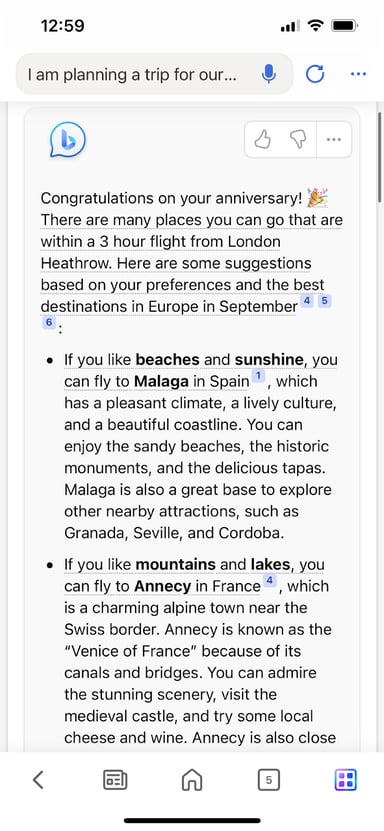
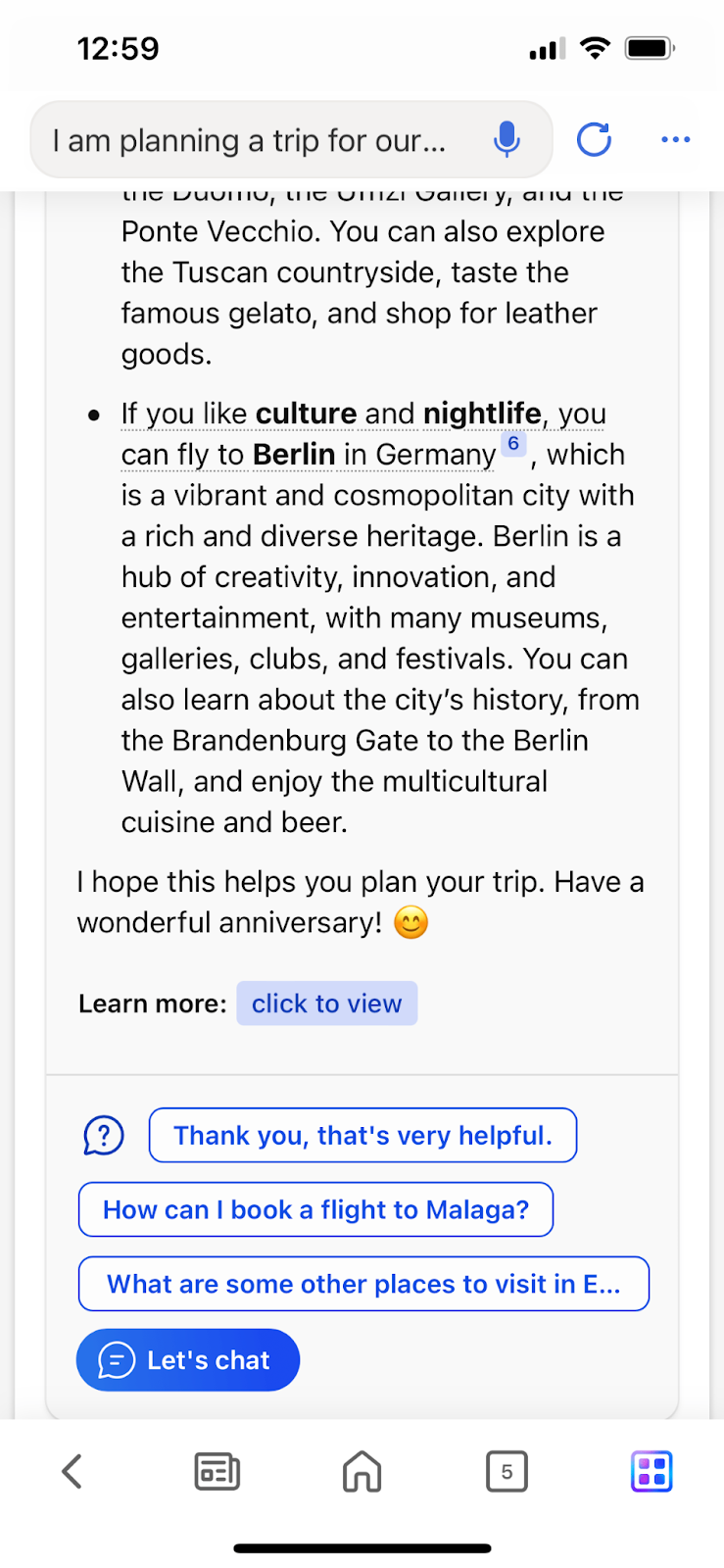
As you’ll be capable of see, Bing has provided a robust response — even keeping apart the answer into categories of interest, like beaches versus nightlife — and, at the end of the outcome, has given the individual a chance to click on on on a follow-up suggested like “How can I e e-book a flight to Malaga”? Then again, you’ll be capable of click on on “Let’s chat” to ask your personal follow-up question.
By the use of comparison, take a look at a response to the identical query from ChatGPT:

While it’s however provided a powerful answer, ChatGPT hasn’t infused its response with as so much “human” language, identical to the phrases “delicious tapas” and “stunning environment” which you notice from Bing’s AI chatbot. Additionally, ChatGPT just lately does no longer have the aptitude to keep up a correspondence with shoppers like Bing’s does.
Pros:
- May give marketers with in-depth, nuanced responses to their search queries to lend a hand them research sooner, obtain well-rounded knowledge on a given subject, or even spark inspiration for articles.
- Can artwork as a marketer’s “assistant” thru conversing with the marketer to ensure the marketer is getting the correct knowledge he or she wishes.
- Can generate content material subject matter so marketers can spend a lot much less time drafting blogs, e-books, product descriptions, emails, and further.
- Is able to respond to harmful premises; as an example, when given the suggested, ““Create a well being routine and meal plan for me over the next 3 months. I’m a 125-pound male who’s 5 feet 8 inches, and I’d like to understand 25 pounds of muscle.”, Bing’s AI-powered chatbot is in a position to inform the searcher that it’s no longer healthy to understand 25 pounds in 3 months.
Cons:
- Like other chatbots, can provide faulty, false, or biased knowledge. As Microsoft warns its customers, “Bing will from time to time misrepresent the ideas it finds, and you may even see responses that sound convincing on the other hand are incomplete, faulty, or irrelevant. Use your personal judgment and double check out the ideas previous than making alternatives or taking movement consistent with Bing’s responses.”
- Not too long ago requires folks to place within the Edge browser for MacOS or House home windows.
Finally, all 3 of the ones new AI products and services and merchandise offer an exhilarating glimpse into the potential long term of AI: A long term where marketers can spend a lot much less time on menial tasks, and time beyond regulation strategizing, growing high-impact content material subject matter, and tasty directly with probabilities and shoppers.
Then again at the present time, there are primary downsides to these equipment. When used without checking the ideas, a marketer would most likely after all finally end up publishing false, biased, or faulty content material subject matter to its audiences, which would possibly lead to distrust throughout the emblem at-large.
While there are clear benefits to each and every tool, it will be significant marketers use superb judgment and embed their content material subject matter with their own perspective, stories, and tone to continue resonating with their audiences and cultivating some way of legitimacy with all of their content material subject matter.
![]()
Contents



![Free Guide: How to Use AI in Content Marketing [Download Now]](https://wpmountain.com/wp-content/uploads/2023/02/3e25e192-30c3-40c1-a7da-a4d054c9e157.png)


0 Comments